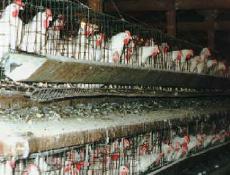The use of tiny, barren-wire enclosures called battery cages is standard in today’s egg factories. About 95 percent of the 300 million laying hens are confined in these cages, unable to engage in many of their natural behaviors including stretching their wings, turning around without touching other birds, nesting, dust bathing, perching and foraging.
Laying hens suffer from a number of welfare concerns due to living in overcrowded battery cages. Cages cause higher occurrences of foot disorders, osteoporosis, uterine prolapse and fractures during depopulation.
Colin Berry ’01, director of the Humane Society of the United States (HSUS) in Colorado has raised concerns of the use of battery-cage eggs in Guilford’s cafeteria: “When I was there, vegans and vegetarians did not have very many choices,” Berry said. “I thought that they were missing out on the opportunity of using cage free eggs.”
Battery cages typically allow each hen only 61 square inches of floor space, less than the area of a letter-sized sheet of paper. According to the HSUS, battery cages for laying hens have been proven to cause extreme frustration, particularly when the hen wants to lay an egg. Lack of nesting opportunity is said to be the source of caged hen’s frustration.
“I’ve been to a cage free farm,” Berry said. “Thousands of birds have nesting boxes and can walk all over the floor. You’re not faced with the inherent, in-your-face cruelty as you would be with battery cages.”
Cage-free hens are kept inside farms or warehouses, but do not necessarily have access to the outdoors. They are able to engage in many of their natural behaviors such as walking, nesting and spreading their wings. However, debeaking and forced molting through starvation are permitted.
Berry spoke to Michaele Watts, dining services manager, about switching to cage-free eggs in March.
“They said that Guilford would be cage-free by August,” Berry said. “It is now November, and students are still eating eggs from battery-cage hens.”
Watts did not respond to emails or phone calls and was unavailable for comment.
Malcolm Kenton, junior and member of the HSUS, would also like to see the cafeteria go cage-free.
“I’ve mentioned it to the food service committee but I guess they didn’t see much of a demand for it,” Kenton said.
Corporations such as Whole foods Market, Earth Fare, Jimbo’s Naturally, and Wild Oats Natural Marketplace implemented cage-free egg policies. AOL and Google are switching to cage-free eggs in their employee cafeterias. Approximately 90 universities and colleges have enacted policies to eliminate or reduce their use of cage-free eggs, including Dartmouth College, the University of New Hampshire, Georgetown University, Tufts University and the University of Wisconsin-Madison.
Berry is concerned because Guilford wasn’t one of the first to make its cafeteria cage-free.
“Guilford is a Quaker institute and stands up for Quaker beliefs and values,” Berry said. “It seems to me that cage-free eggs are consistent with those values.”
Kenton believes in the humane treatment of all animals. “The first step is to get people to realize that animals aren’t productive units,” Kenton said. “They deserve respect.
Jon Mangin, sophomore and health-conscience student, supports the cafeteria going cage-free.
“The treatment of hens in corporate cage farm systems is inconsistent with Guilford’s core values,” Mangin said. “I think Guilford students would especially be appalled at the treatment of battery cage hens.”
Countries such as Germany, Switzerland, Austria and Sweden have banned battery cages. The entire European Union is phasing out conventional cages by 2012.

